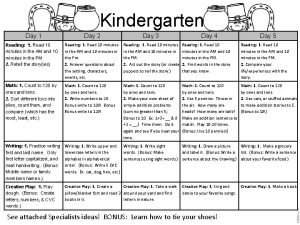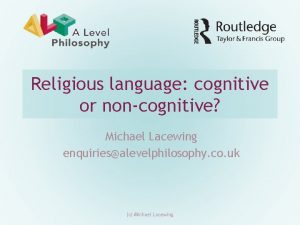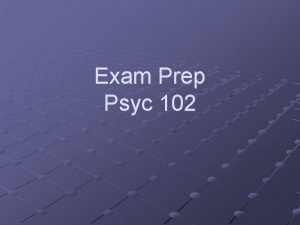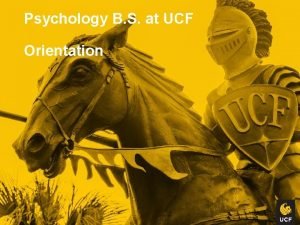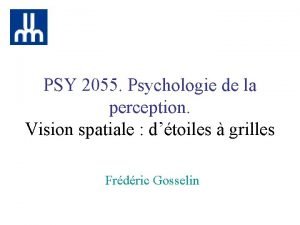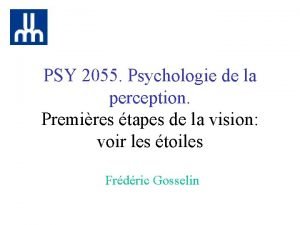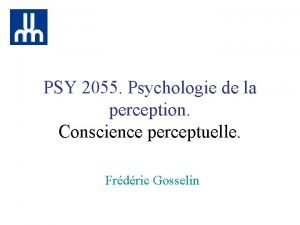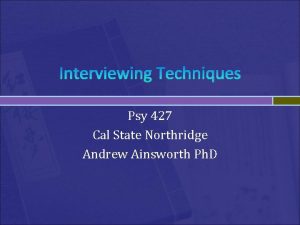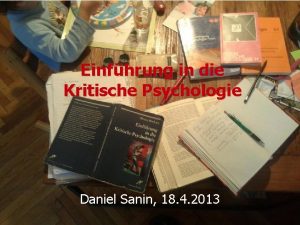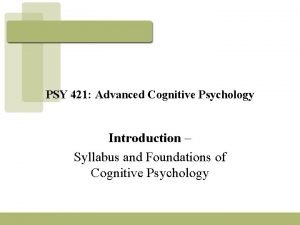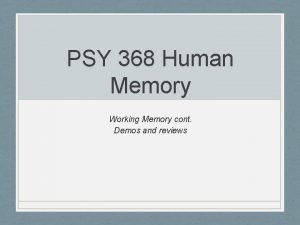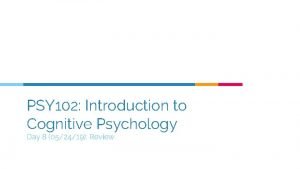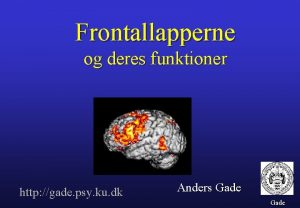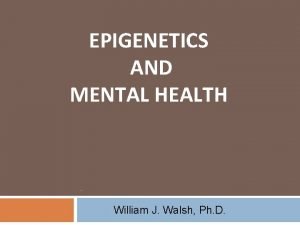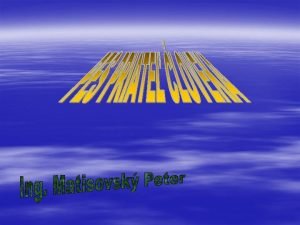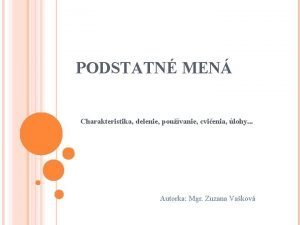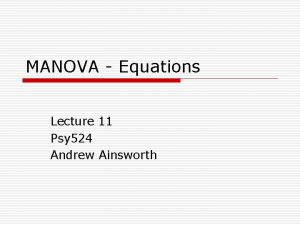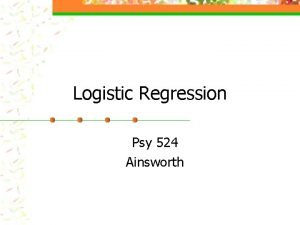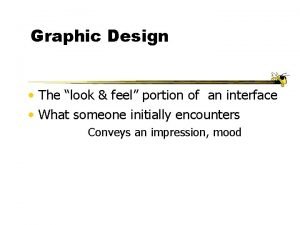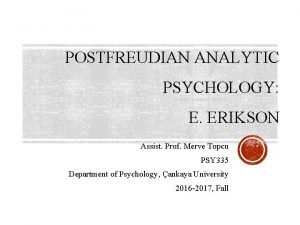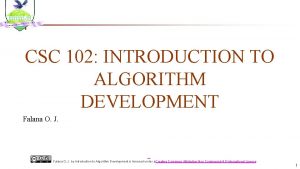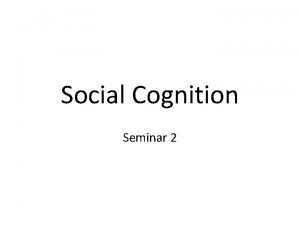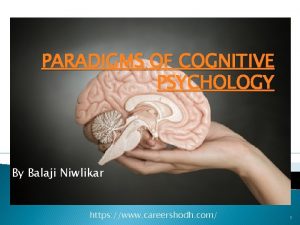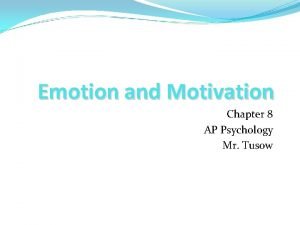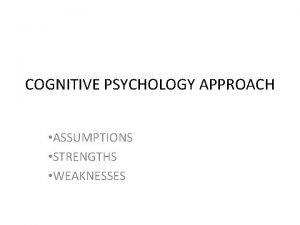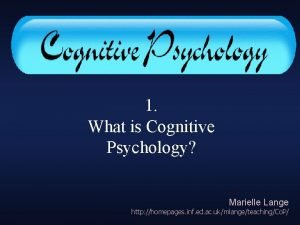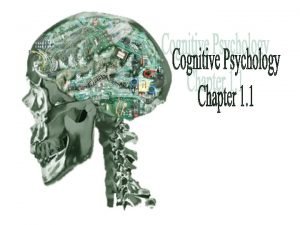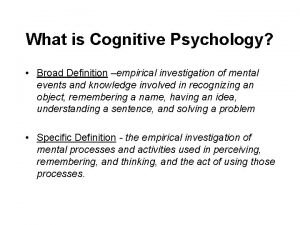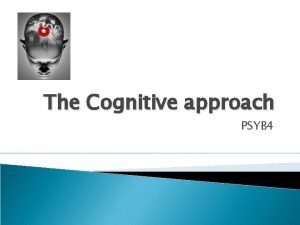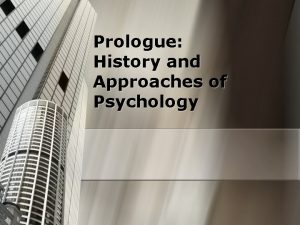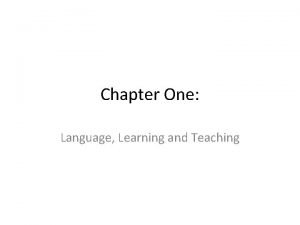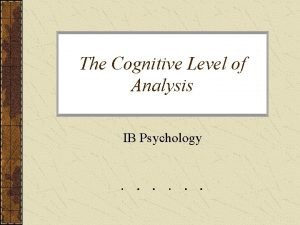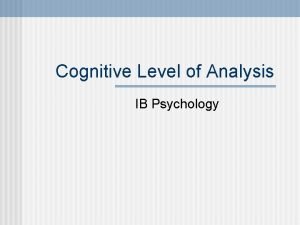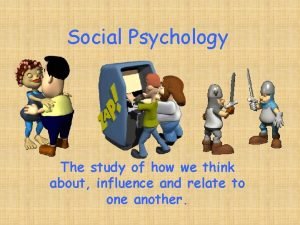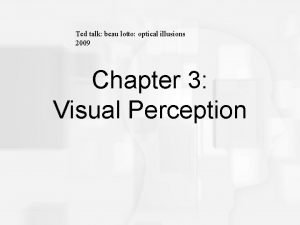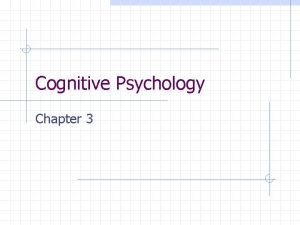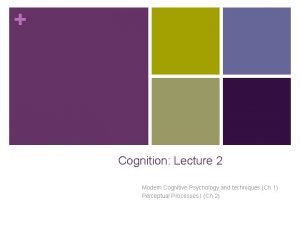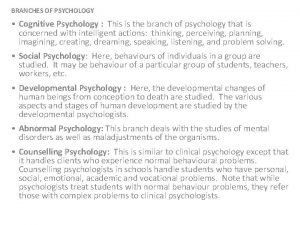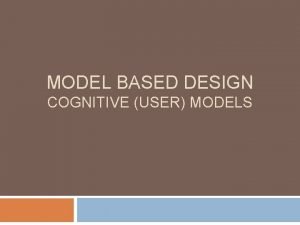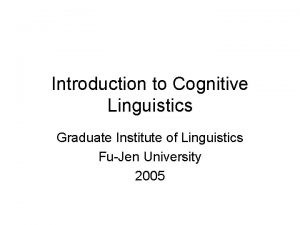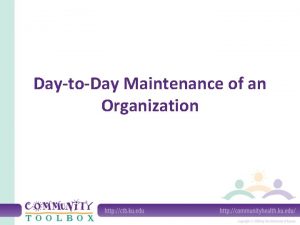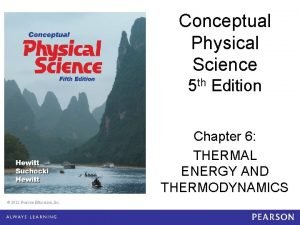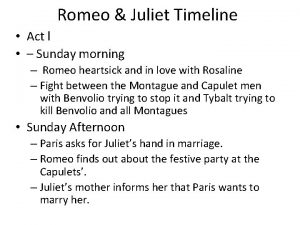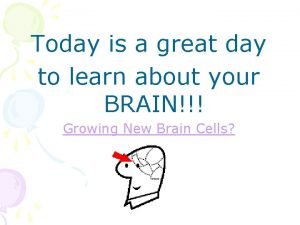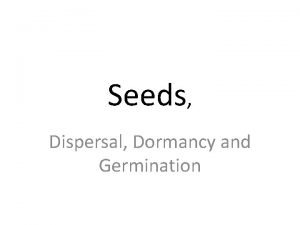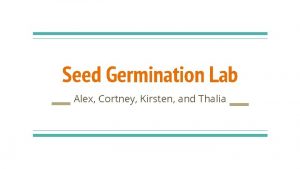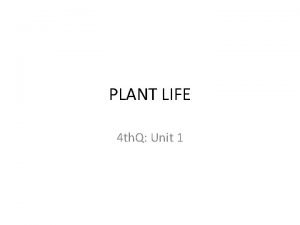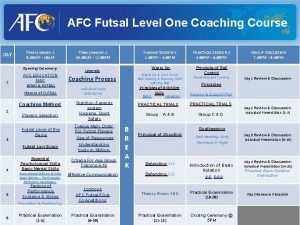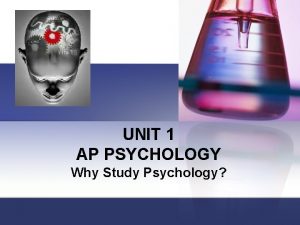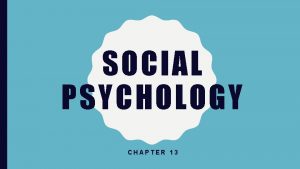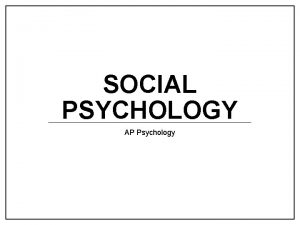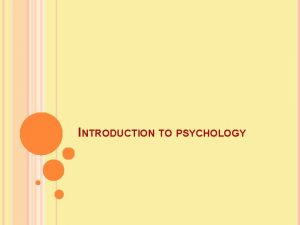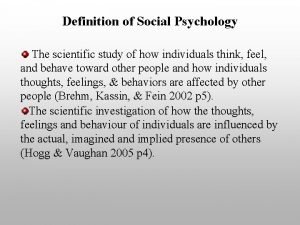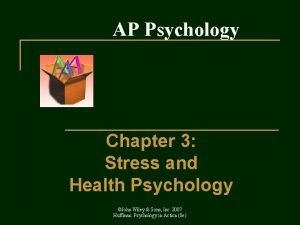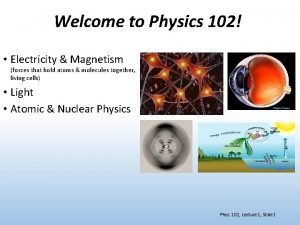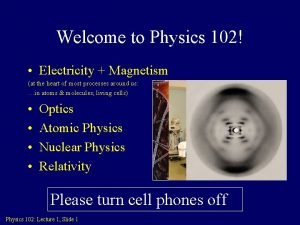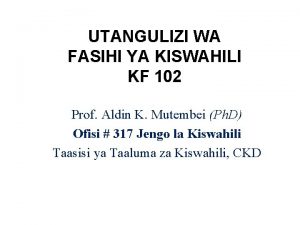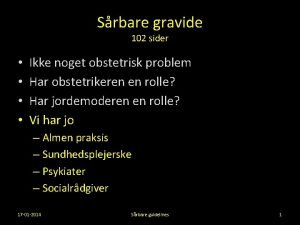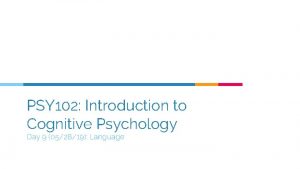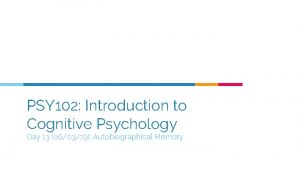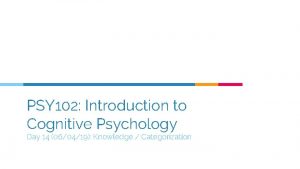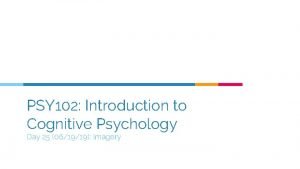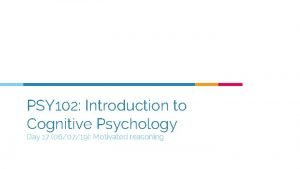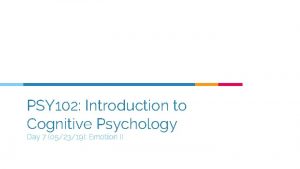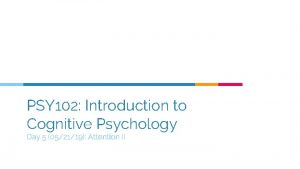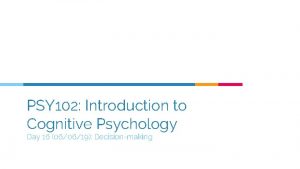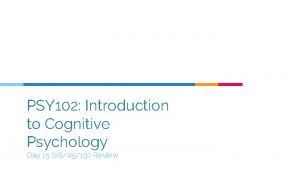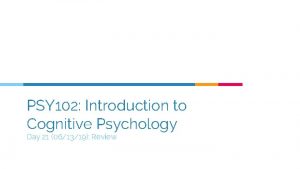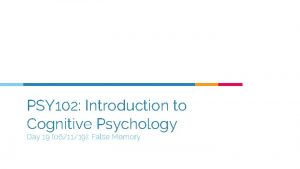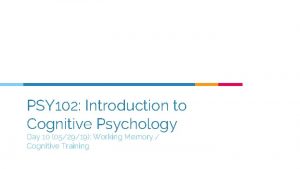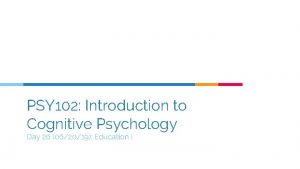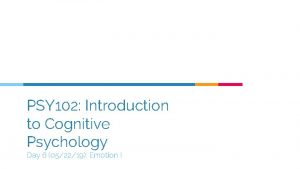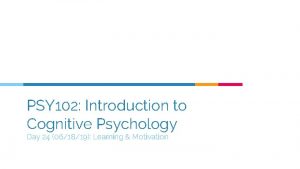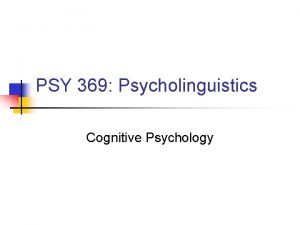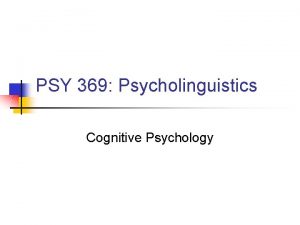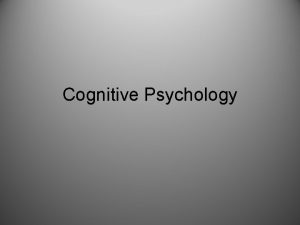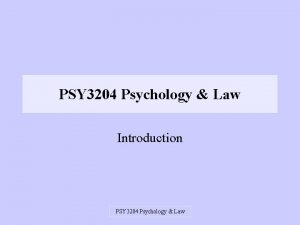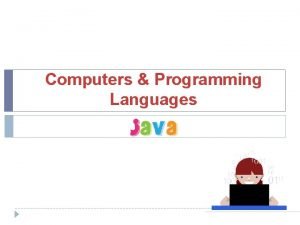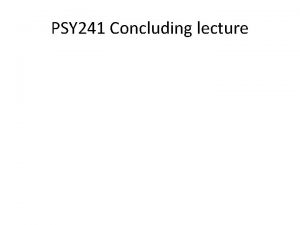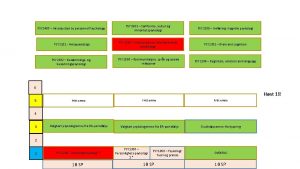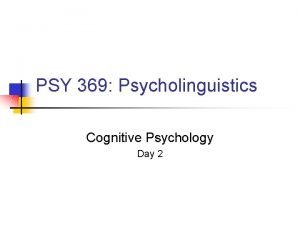PSY 102 Introduction to Cognitive Psychology Day 12










































![Self-reference ▷ “[W]hen we relate things we want to remember to ourselves, this can Self-reference ▷ “[W]hen we relate things we want to remember to ourselves, this can](https://slidetodoc.com/presentation_image_h/09e7035403375db192c56350b818322d/image-43.jpg)



































- Slides: 78

PSY 102: Introduction to Cognitive Psychology Day 12 (05/31/19): LTM Processes & Mechanisms

Today’s Goals + Agenda 1. LO 1: Continue to build a supportive classroom culture & discuss science communication ○ Discuss Wikipedia profile ○ Discuss a rubric for science summary pieces based off of the ripples article + previous Journal club article 2. LO 2: Describe the basic mechanisms of memory processes ○ Review LTM: structure material ○ Discuss Goldstein chapter 7 about memory processes 3. LO 3: Summarize and critically analyze academic journal articles ○ Now that the research has been contextualized on what are considered basic memory processes, how does our previous discussion on WEIRD samples apply here? Are these basic memory principles? ○ What are real-world implications? What are ongoing questions in the memory field?

https: //twitter. com/justsaysinmice The importance of accurate science reporting

Minute Paper ▷ Quiz, readings, + science summary next Monday-push opening paragraph to Tuesday? ▷ Priming ▷ Some of the implicit/non-declarative distinctions ▷ Hippocampus & primacy effect

Wikipedia + Science Summary Piece Continue to build a supportive classroom culture & discuss science communication

Gelinas, Science Summary ▷ ▷ Take a couple of minutes to refresh your memory of the Gelinas (2019) coverage of the Vaz article in Science ○ How did this piece differ in terms of audience, structure, etc. from yesterday’s science summary piece? ○ Is there anything you want to modify in the science summary assignment guideline? After a couple of minutes, discuss with the person next to you. We will come together afterwards to discuss as a class.

Wikipedia Piece ▷ ▷ ▷ Name, Photograph Identifying information ○ Birth date, employment, degrees, education, workplaces, etc. Summary of Significant Contributions to Psychology ○ Theories, What They’re Known For (e. g. , often most cited papers) Relevant Personal History ○ Career & Honors / Awards, Lab, Topics of interest, etc. Can help establish ‘notable academic’ criterion More detail: ○ Books, articles, professional service References : ○ Journals, books, magazines, newspapers ○ Evidence piece

Review / A Little More on LTM: Structure

Serial Position Curve ▷ Primacy Effect ▷ Recency Effect ▷ What happens w/ delay? Slow presentation? ▷ MTL amnesic patients? MTL includes hippocampus, amygdala, etc.

Serial Position Curve ▷ Primacy Effect ▷ Recency Effect ▷ What happens w/ delay? Slow presentation? ▷ MTL amnesic patients? MTL includes hippocampus, amygdala, etc.

Nondeclarative/Implicit ▷ Memories that we “aren’t aware of” ○ Unconsciously influence our behavior or cognition ▷ Procedural learning ○ Memory for skills Priming ○ A change in processing of a stimulus due to previous encounter with the same or a related stimulus, in the absence of conscious awareness of the original encounter Classical conditioning ○ Pairing one stimulus with another so that the conditioned stimulus evokes the same response as the unconditioned stimulus ▷ ▷

Nondeclarative/Implicit ▷ ▷ ▷ Procedural learning ○ Ex: Mirror drawing, typing, riding a bike, doing a somersault, playing an instrument ○ You might have a hard time explaining it, but you just do it Priming ○ Seeing bird - responding faster to bird later on ○ Word-fragment/stem completion: _ S S _ _, ele______ ○ Other types: ■ Your prime is Envelope, Target: Envelope, Cue: Stationary ■ Envelope, target is Letter (semantic priming) Classical conditioning ○ Ex: blinking after tone; reaction to bugs

Episodic vs. (Perceptual) Priming ▷ ▷ Developmental dissociations Brain damage ○ MS had right occipital lobe lesion

Short-Term Memory vs. LTM ▷ H. M. & Clive Wearing both OK on STM, but impaired in LTM ▷ K. F. impaired in STM, but OK in LTM ○ Lesion close to language processing area ○ Digit span only 3 digits ▷ Recency vs. primacy effect; MTL amnesics on serial position curve ▷ Recent research suggests maybe more complicated

If you can’t find a neuropsych patient. . . ▷ See what part of the brain activates in healthy participants ○ E. g. , semantic & episodic activate different regions of the brain ▷ Temporarily turn off parts of healthy participants’ brains ○ What methods are these pts? ▷ Complementary w/ lesions

Try to fill out evidence for each branch in a group

Subdivisions of Memory Episodic vs. Semantic: K. C. vs. Italian Woman Episodic vs. Procedural: H. M. /Clive vs. Parkinson’s Episodic vs. Priming: Developmental & MS Episodic vs. Conditioning: exists, not discussing STM vs. LTM: HM/Clive vs. K. F. ; recency vs. primacy Past exp MTL diencephalon facts MTL Left Temporal Cortex Emotion: amygdala Motor: cerebellum skills striatum neocortex

Demo Instructions You will be presented with three 12 word lists and you must ‘encode’ them for 1 minute before I ask you to recall the words that were presented to you… Any questions? Ready?

Demo: List 1 CYB JPL WSP CLT LXK MSY TPR CLA SSS BLR DRW QRZ

Demo: Recall For the next minute, try to write down as many trigrams you can remember…

Demo: List 2 FLL DFW PHX LAS ORD CLT IAD SFO DTW DEN PHL

Demo: Recall For the next minute, try to write down as many trigrams you can remember…

Demo: List 3 YOU DAD HIM MOM HIS ALL MAN WHO HER OLD BOY OUR

Demo: Recall For the next minute, try to write down as many trigrams you can remember…

Check Your Answers LIST 1 LIST 2 LIST 3 CYB FLL YOU WSP PHX HIM LXK LAS HIS TPR CLT MAN SSS SFO HER DRW DEN BOY JPL DFW DAD CLT LAX MOM MSY ORD ALL CLA IAD WHO BLR DTW OLD QRZ PHL OUR

Thoughts on the Demo? Which list did you remember the best? (Include both # of correct & incorrect responses) Why do you think that might be? How does that relate to the LTM structure you learned?

Everyday Implications ▷ Perfect and Askew (1994) ○ Propaganda effect: more likely to rate statements read or heard before as being true ○ “Buying Attention” ▷ Pop culture ○ Memory loss is everywhere… Dory, The Bourne movies, Memento, Eternal Sunshine of the Spotless Mind. . .

Ben-Yakov & Henson (2018)

Uitvlugt and Healey (2018)

LTM: Processes & Mechanisms Describe the basic mechanisms of memory processes

How the Processes Relate

Rehearsal ▷ Maintenance rehearsal ○ “P. Sherman, 42 Wallaby Way, Sydney” x 1000 ▷ Elaborative rehearsal ○ Favorite books, movies, etc. ○ My friend lives in Sydney

Demo I will present a list of words Your job is to count the of consonants in the list You will have 30 seconds

Demo: List 1 Teacher Shoe Campus Rabbit Yoga Brother Winter Pretzel Firefighter Car Worm Pillow Home Waitress Rose Bank Woman Coin Restaurant Yarn

Demo: List 1 Recall as many words as you can

Demo: List 2 Recall I will present a list of words Your job is to think of an antonym for each word You will have 30 seconds

Demo: List 2 Dentist Pencil Office Black Lunchbox Sun Friend Toothbrush Cucumber President Lake Mustard Paper Football Drink Evening Beard Mail Boat Wallet

Demo: List 2 Recall as many words as you can

Demo Debriefing ▷ Which list was easier to recall? ○ Why? ▷ How can this idea be applied when studying for a test?

Retrieval Success Related to How You Encode ▷ Levels of processing ○ Shallow processing ■ little attention to meaning ■ focus on physical features ■ poor memory ○ Deep processing ■ close attention to meaning ■ better memory

Levels of Processing

Problems with LOP theory ▷ Circularity ○ Why? ▷ Deeper processing at encoding → facilitated retrieval ○ Except?
![Selfreference When we relate things we want to remember to ourselves this can Self-reference ▷ “[W]hen we relate things we want to remember to ourselves, this can](https://slidetodoc.com/presentation_image_h/09e7035403375db192c56350b818322d/image-43.jpg)
Self-reference ▷ “[W]hen we relate things we want to remember to ourselves, this can lead to stronger memories…” (Rogers et al. , 1977) ▷ Yin et al. (2019), re: working memory & self-reference

Demo: Organization Left side of class, close your eyes Right side of class, pay attention to the following passage. Try to remember it.

Demo: Organization If the balloons popped, the sound wouldn’t be able to carry since everything would be too far away from the correct floor. A closed window would also prevent the sound from carrying, since most buildings tend to be well insulated. Since the whole operation depends on the steady flow of electricity, a break in the middle of the wire would also cause problems. Of course, the fellow could shout, but the human voice is not loud enough to carry that far. An additional problem is that the string could break on the instrument. Then there would be no accompaniment to the message. It is clear that the best situation would involve less distance. Then there would be fewer potential problems. With face-to-face contact, the least number of things could go wrong.

Demo: Organization Right side of class, close your eyes Left side of class, pay attention to the following passage. Try to remember it.

Demo: Organization

Demo: Organization If the balloons popped, the sound wouldn’t be able to carry since everything would be too far away from the correct floor. A closed window would also prevent the sound from carrying, since most buildings tend to be well insulated. Since the whole operation depends on the steady flow of electricity, a break in the middle of the wire would also cause problems. Of course, the fellow could shout, but the human voice is not loud enough to carry that far. An additional problem is that the string could break on the instrument. Then there would be no accompaniment to the message. It is clear that the best situation would involve less distance. Then there would be fewer potential problems. With face-to-face contact, the least number of things could go wrong.

Demo Debriefing Left side: what do you remember? Right side: what do you remember? Takeaway?

Demo Debriefing Left side: what do you remember? Right side: what do you remember? Takeaway? Having a mental framework of comprehension aids memory encoding and retrieval

Testing Effect / Retrieval Practice ▷ Roediger & Karpicke 2006 ○ Group 1: Re-read a passage ○ Group 2: Tested on material in passage ○ At delay, Group 2 > Group 1

Retrieval ▷ Retrieval: process of transferring information from LTM back into working memory (consciousness) ○ Most of our failures of memory are failures to retrieve ○ Paradigms: ■ Cued Recall ■ Free Recall ■ Recognition Memory

Encoding specificity (A)

State-dependent learning ▷ Learning is associated with a particular internal state ○ Better memory if person’s mood at encoding matches mood during retrieval

Transfer-appropriate processing ▷ Encoding task ○ Group 1: Meaning task ○ Group 2: Rhyming task ▷ Retrieval task: “Was there a word that rhymed with ___? ” ○ Group 2 > Group 1

Rest of this material to be covered on Monday w/ autobiographical memory Not responsible for this on quiz

Spaced Learning ▷ Distributed versus massed practice ○ Difficult to maintain close attention throughout a long study session ○ Studying after a break gives feedback about what you already know ▷ In part why summer session is not actually good, via cog psych. . .

Other Factors that Aid Encoding ▷ Visual imagery (paired associates; boat-tree) ▷ Generation effect (demos, worksheets) ▷ Relating words to survival value Study tips: ▷ ▷ Elaborate Generate & test Avoid “illusion of learning” Sleep

Consolidation ▷ Transforms new memories from fragile state to more permanent state ○ Synaptic consolidation occurs at synapses, happens rapidly ○ Systems consolidation involves gradual reorganization of circuits in brain

Consolidation

Information Storage at the Synapse ▷ Long-term potentiation (LTP) ○ Enhanced firing of neurons after repeated stimulation ○ Structural changes & enhanced responding in the postsynaptic neuron ○ Repetition suppression

Information Storage at the Synapse

Standard Model of Consolidation ▷ Retrieval depends on hippocampus during consolidation; after consolidation hippocampus is no longer needed ▷ Reactivation: hippocampus replays neural activity associated with memory

Consolidation: Not Everything Has Been Solved ▷ Multiple trace hypothesis ○ Questions the assumption that the hippocampus is important only at the beginning of consolidation ○ Hippocampus: activated during retrieval of recent & remote memories ○ Hippocampus response can change over time ○ Ripples. . .

Vaz et al. (2019)

Can You Modify Memories? ▷ Propranolol ▷ Reconsolidation ▷ Memory is constructive, possibly never permanent b/c needs to be updated (cc: Shute, 2014) Real-world clinical impact?

Takeaways ▷ ▷ ▷ Retrieval of information is affected by how you encoded that information ○ Levels of processing theory → deeper processing at encoding = more likely to retrieve later ■ Elaborative vs. maintenance rehearsal ■ Organization facilitates retrieval ■ Self-reference facilitates retrieval ○ But LOP theory has a big problem… The encoding context (encoding specificity), state during encoding (state-dependent learning), and task during encoding (transfer-appropriate processing) matter Memory is a constructive process

Today’s Goals + Agenda 1. LO 1: Continue to build a supportive classroom culture & discuss science communication ○ Discuss Wikipedia profile ○ Discuss a rubric for science summary pieces based off of the ripples article + previous Journal club article 2. LO 2: Describe the basic mechanisms of memory processes ○ Review LTM: structure material ○ Discuss Goldstein chapter 7 about memory processes 3. LO 3: Summarize and critically analyze academic journal articles ○ Now that the research has been contextualized on what are considered basic memory processes, how does our previous discussion on WEIRD samples apply here? Are these basic memory principles? ○ What are real-world implications? What are ongoing questions in the memory field?

Monday’s Work ▷ Readings ○ ○ Rubin et al. (2019) - duke Stanley et al. (2017) - duke Leung (2019) - cool real-world application Podcast: A Highly Superior Memory | All in the Mind ▷ Quiz ▷ Opening Paragraph Science Summary (Possibly Tuesday if Class Moved)

Participation + Minute Paper https: //tinyurl. com/PSY 102 Participation https: //tinyurl. com/PSY 102 Minute. Paper. May 31

Additional Practice Optional: Test Yourself

General questions What strategies or tips would you give to someone looking to study better, knowing what you know about cognitive psychology research into memory and attention? Self generate examples of each behavioral effect outside the study examples. What does it mean for memory to be constructive? What are the breakdowns of each memory process and the structure of long-term memory, and how does this interact with what we know about short-term/working memory? What are the open questions of the field?

Elaborative rehearsal of a word will LEAST likely be accomplished by ▷ Repeating it over and over ▷ Linking the new word to a previously learned concept ▷ Using it in a sentence ▷ Thinking of its synonyms & antonyms

Elementary school students in the U. S. are often taught to use the very familiar word "HOMES" as a cue for remembering the names of the Great Lakes (each letter in "HOMES" provides a first-letter cue for one of the lakes: Huron, Ontario, Michigan, Erie, Superior). This memory procedure usually works better than repeating the names over and over. The use of this familiar word provides an example of ▷ ▷ A self-reference effect Repetition priming Implicit memory Elaborative rehearsal

Which of the following learning techniques is LEAST likely to lead to deep processing of the information? ▷ ▷ Trevor is trying to understand how to use statistics by drawing associations between a set of data describing how adolescents respond to peer pressure and theories he learned last semester in developmental psychology. Maggie is trying to learn new vocabulary words because she is taking the SAT next month. Each day, she selects one word. Throughout the day, she repeats the definition over and over to herself and generates sentences using it in her conversations that day Bree has just bought a new car and is trying to learn her new license plate sequence. Every morning, for three weeks, she repeats the sequence out loud when she wakes up. For history course, Bruce is trying to learn the order of the U. S. presidents by creating a silly sentence where each consecutive word starts with the same letter of the next president to be remembered.

People often report an annoying memory failure when they walk from one end of the house to the other for something and then forget what they went to retrieve when they reach their destination. As soon as they return to the first room, they are reminded of what they wanted in the first place. This common experience best illustrates the principle of ▷ ▷ The self-reference effect Maintenance rehearsal Levels of processing theory Encoding specificity

Brief episodes of retrograde amnesia (e. g. , the traumatic disruption of newly formed memories when a football player takes a hit to the head and can't recall the last play before the hit) reflect ▷ A failure of memory consolidation ▷ Disrupted long-term potentiation ▷ Temporary post-traumatic stress disorder ▷ Korsakoff’s syndrome

Answer Key Repeating Elaborative Bree Encoding specificity Failure of memory consolidation
 Day 1 day 2 day 3 day 4
Day 1 day 2 day 3 day 4 Day 1 day 2 day 817
Day 1 day 2 day 817 Cognitive and non cognitive religious language
Cognitive and non cognitive religious language Psychology 102 practice test
Psychology 102 practice test Euro psy
Euro psy Ucf psych advising
Ucf psych advising Psy 2055
Psy 2055 Psy 2055
Psy 2055 Xxxxblue
Xxxxblue Psy
Psy Daniel sanin
Daniel sanin Psy
Psy Psy
Psy Psy
Psy Psy
Psy Psy 226
Psy 226 Maria took a drink from a container marked milk
Maria took a drink from a container marked milk Alla kulikova
Alla kulikova Damasio
Damasio Psy walsh
Psy walsh Pes charakteristika
Pes charakteristika Bradla sklonovanie
Bradla sklonovanie 11 psy
11 psy Regression psy
Regression psy Psy
Psy What is adoloscence
What is adoloscence Csc 102 pdf
Csc 102 pdf Self fulfilling prohecy
Self fulfilling prohecy 4 paradigms of cognitive psychology
4 paradigms of cognitive psychology Emphasis
Emphasis Ap psychology chapter 8 emotion and motivation test
Ap psychology chapter 8 emotion and motivation test Strengths of the cognitive approach
Strengths of the cognitive approach 5 major domains of psychology
5 major domains of psychology Cognitive economy psychology definition
Cognitive economy psychology definition Computer metaphor in cognitive psychology
Computer metaphor in cognitive psychology History of cognitive psychology
History of cognitive psychology History of cognitive psychology
History of cognitive psychology Cognitive meaning in psychology
Cognitive meaning in psychology Cognitive essay
Cognitive essay Cognitive psychology crash course
Cognitive psychology crash course Cognitive model psychology
Cognitive model psychology Structural linguistic and behavioral psychology
Structural linguistic and behavioral psychology Hamid zolfaghari
Hamid zolfaghari Reconstructive memory ib psychology
Reconstructive memory ib psychology Ib psychology cognitive level of analysis
Ib psychology cognitive level of analysis Cognitive dissonance ap psych
Cognitive dissonance ap psych Token economy psychology
Token economy psychology Visual pathways
Visual pathways Transduction psychology
Transduction psychology Cognitive psychology
Cognitive psychology Branches of psychology
Branches of psychology An introduction to model-based cognitive neuroscience
An introduction to model-based cognitive neuroscience Lexical category
Lexical category William beanes elementary
William beanes elementary Oceans apart day after
Oceans apart day after Day to day maintenance
Day to day maintenance Physical science chapter 6 review answers
Physical science chapter 6 review answers Tomorrow i dont know
Tomorrow i dont know Timeline of events in romeo and juliet
Timeline of events in romeo and juliet Growing day by day
Growing day by day Define seed dormancy
Define seed dormancy Conclusion of seeds
Conclusion of seeds Observation of plant growth day by day
Observation of plant growth day by day I live for jesus day after day
I live for jesus day after day Casting crowns one day
Casting crowns one day Day one day one noodle ss2
Day one day one noodle ss2 Afc futsal coaching course level 1
Afc futsal coaching course level 1 Positive psychology ap psychology definition
Positive psychology ap psychology definition Psychology chapter 13
Psychology chapter 13 Social psychology ap psychology
Social psychology ap psychology Introspection method in psychology
Introspection method in psychology Social psychology is the scientific study of
Social psychology is the scientific study of Health psychology definition ap psychology
Health psychology definition ap psychology 4 forces of nature
4 forces of nature Phys 102 uiuc
Phys 102 uiuc Kitabu cha mulokozi 2017
Kitabu cha mulokozi 2017 Kraniesynostose
Kraniesynostose Convenio 102 norma minima de seguridad social
Convenio 102 norma minima de seguridad social Psalm 102 niv
Psalm 102 niv
